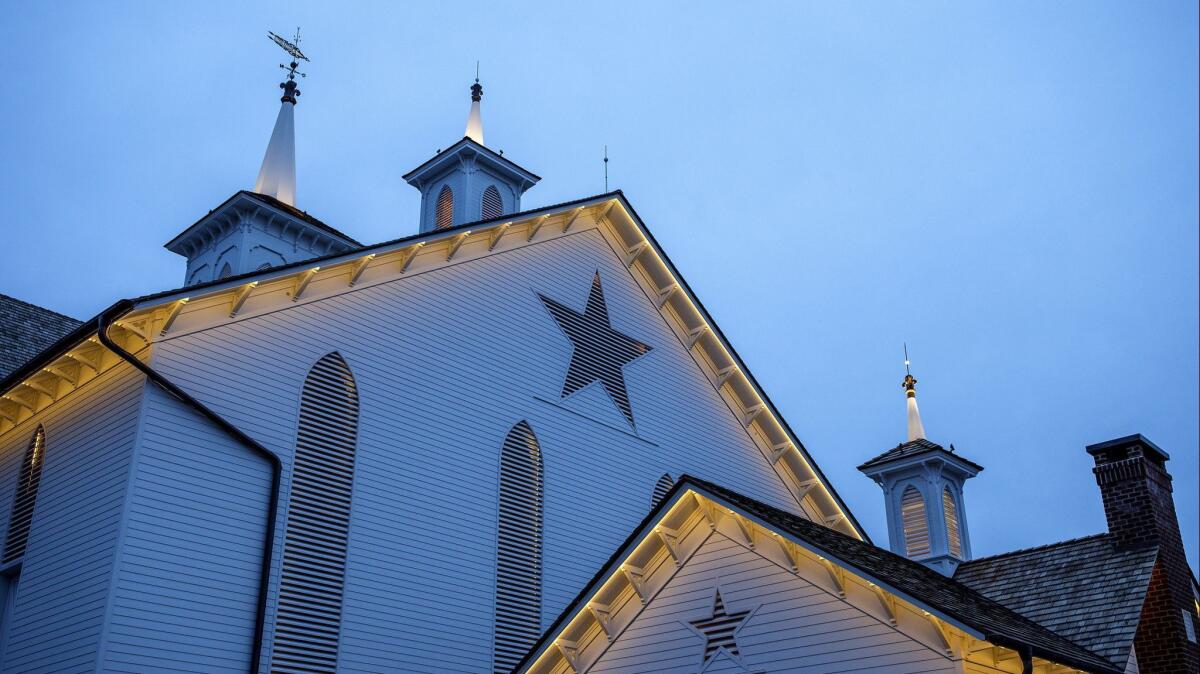Op-Ed: Christmas Day shines, no matter where it’s celebrated

- Share via
We are hopeless sentimentalists in my family. We talk endlessly about incidents long past, small and large, and we keep old cards, faded photographs, childhood tokens. Each of us remembers different details, different moments. Our memories blur.
I’m thinking about all this as I prepare to join my family in Dallas for Christmas. As always, we will fill the room with chatter and laughter, hugging and kissing, gossiping, catching up on our everyday lives.
But Christmas, the one day of the year when we come together in one place, also quietly stirs currents that run deep, memories of other Christmases, other places, other times.
When I was very young we lived with Abuelita, my mother’s mother, in a middle-class neighborhood of San Juan, Puerto Rico. Back then, Christmas Day came mysteriously, overnight. My sister and I would wake up at the first sign of light and tiptoe to the living room to discover what Santa had left us. We tore into shiny wrapped boxes that held porcelain dolls and roller skates and coloring sets. One year, we woke to find sparkly new Schwinn bicycles for us both, hers blue, mine green.
Christmas, the one day of the year when we come together in one place, also quietly stirs currents that run deep, memories of other Christmases, other places.
Dinners were daylong fiestas where cooks served arroz con gandules, morcillas, pasteles, potato salad and lechon asado, a whole pig that had been roasted in a pit at my father’s farm.
They were always the same, those family Christmases. My father and his brothers would huddle around the liquor cabinet in the dining room, downing shots of Don Q rum, talking loudly. The women gathered in the living room, chattering about their children, a chorus of joys and some laments. The children in question, meanwhile, banged on the piano, ran in and out of the house, chased one another or, when we were older, danced late into the night.
Years later came a different kind of Christmas. I was 14, studying at an all-girls prep school near Philadelphia, where I was the only Latin American. My family was 1,500 miles away, and a senior who was my “big sister” invited me to spend the holiday at her home in a Pennsylvania steel town.
Mill executives like her father lived in the hills, up narrow winding roads. Their beige-trimmed brick house built on several sloping acres that bordered a trickling creek couldn’t have been more different from the Mediterranean-style houses in San Juan. Their neighborhood was one of colonial pillars and multilevel houses with big garages, big cars, wall-to-wall carpets, chandeliers, playrooms, pool tables, heavy drapes. Scotch was what they drank in those houses.
Seated in the back of my friend’s station wagon on the drive from school, I saw a very different style of Christmas from the ones I had known up to then. In Puerto Rico, Christmas was boisterous. We had garlands of lights, music blasting from trucks, church bells pealing.
By contrast, Christmas in Pennsylvania seemed subdued. Neat strings of lights framed brick buildings and a single, tall Christmas tree brightened the town square. But I loved it all. At a Methodist church service held in an auditorium packed with parents and children, everyone singing “Joy to the World,” I was moved nearly to tears.
On Christmas Day, under a ceiling-high fir tree trimmed with popcorn and cranberries, there were at least a dozen gifts, wrapped neatly in dazzling paper and adorned with huge red and green bows. Christmas stockings hung above the fireplace, names embroidered on each.
My friend’s father carried fire logs up from the garage, poked at the embers, and then sat in his lounging chair, smoking a pipe and nursing a tumbler of Scotch. In the dining room, her mother set out turkey and stuffing, mashed potatoes, casseroles of carrots and turnips, mixed salad, cranberry dressing. Pumpkin and apple pies and gingerbread cookies were arranged on platters on a sideboard.
Enter the Fray: First takes on the news of the minute from L.A. Times Opinion »
There was no lechon asado, no Cuba libres, no dance music. But I was happy sharing that family on that day. It was a Christmas unlike any I had known, so quiet outside the house, and inside, too, with logs crackling in the fireplace and football on TV.
Over the years, my Christmases continued to change. After my parents divorced, my mother married a rangy Texan who couldn’t imagine living in the Caribbean. So, while I was away at college, she left her San Juan law practice and moved with my younger siblings to Texas. Our Christmases quickly took on Texan trappings. Instead of a whole pig, we had brisket or ham, macaroni and cheese, green bean casserole and, as a concession to mother’s taste, flan for dessert. These dishes have become part of our family tradition.
But the Christmases of my childhood are never far from my thoughts. In the hum of conversation, I hear the street music of San Juan; the brisket brings back the memory of lechon asado; and the warmth of being with my family invariably reminds me of my parents then, embracing and holding me tight those mornings when I had no cares in the world.
Luisita Lopez Torregrosa is a journalist and former editor at the New York Times. She is the author of two nonfiction books, most recently, “Before the Rain: A Memoir of Love & Revolution.”
More to Read
A cure for the common opinion
Get thought-provoking perspectives with our weekly newsletter.
You may occasionally receive promotional content from the Los Angeles Times.









